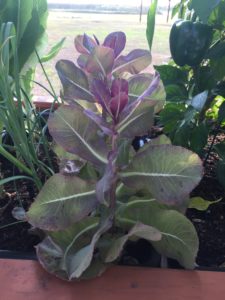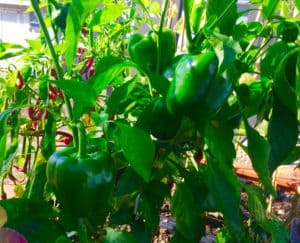 The Florida heat has reared its head early this year, in the beginning of May. And the lettuce, basil and cilantro have all bolted up to the sky and started to flower. Not to mention the havoc it wreaks on cucumbers, squash and zucchini plants.
The Florida heat has reared its head early this year, in the beginning of May. And the lettuce, basil and cilantro have all bolted up to the sky and started to flower. Not to mention the havoc it wreaks on cucumbers, squash and zucchini plants.The early bolting of heat sensitive plants causes low yield for the season. Once a plant bolts, it will no longer produce new growth, fruit or vegetables that season. The reason plants bolt is because the environment, and in this case the temperature, signals the plant that its season is over and it’s about to die. This causes the plant to shoot up and produce flowers and shed seeds for the next season. Those seeds then lay dormant until the temperature is right and the growing cycle begins again. It is a beautiful process – except when it happens in mid season, as it has started to do this year.
There is no way to prevent heat sensitive plants from bolting, but you can prolong the process for a couple of weeks by taking these steps: Harvest plants and herbs often. If the stalks are shooting up and beginning to flower at the top, snip the flowers off. Then harvest the plant to stimulate new growth. Provide some shade for the plants if possible during the hottest part of the day. Use a patio umbrella for container gardens.
Select varieties of plants that are “slow bolting” and “heat tolerant.” Spring has been a challenging season this year all around for Central Florida vegetable growers. The last frost was late in February and, coupled with the unseasonably hot May, caused the spring season to get cut short at both ends. There are some spring vegetables that can tolerate this heat and continue to produce, such as heat loving tomatoes, eggplant and peppers. These plants could continue to produce into June. Other heat sensitive varieties include squash, zucchini and cucumbers. If it is possible to provide some partial shade for these plants, that can help encourage production in these unseasonably hot months.
It is not possible to prevent bolting altogether. When the heat takes over the garden in Florida, many gardeners pack it up for the summer. That is a respectable decision for gardeners that would like a break for the summer. There are, however, some other options. Once the heat sensitive lettuce and herbs bolt, it will be time to move on to summer vegetable varieties. Many believe that growing a summer garden in Florida is just more work than it’s worth. With traditional in-ground gardening, and daily manual watering and weeding, that certainly can be true.
However, there are ways to beat the heat and grow vegetables throughout the summer. To be successful in vegetable gardening throughout the summer, regular watering is key. Since most busy people do not have the time to water a garden every day, ensure you have an automatic watering system, such as drip irrigation or a soaker hose with a timer. This will ensure your garden is cared for during the busy and hot summer days. A raised or elevated garden can significantly minimize the amount of weeding required as well by using a sterile potting mix. This reduces the overall time needed to spend in the garden.
Be sure to choose vegetable varieties that grow well in the summer, such as Calabaza squash, okra, jicama, and southern peas. Malabar and longevity spinach also can be grown as a substitute for greens in salads and smoothies throughout the summer. There are some hearty herbs such as African blue basil, parsley, thyme, mint and rosemary that grow well during these months.
For a more comprehensive menu of summer vegetables, visit www.mynonasgarden.com/seasonalmenu.



